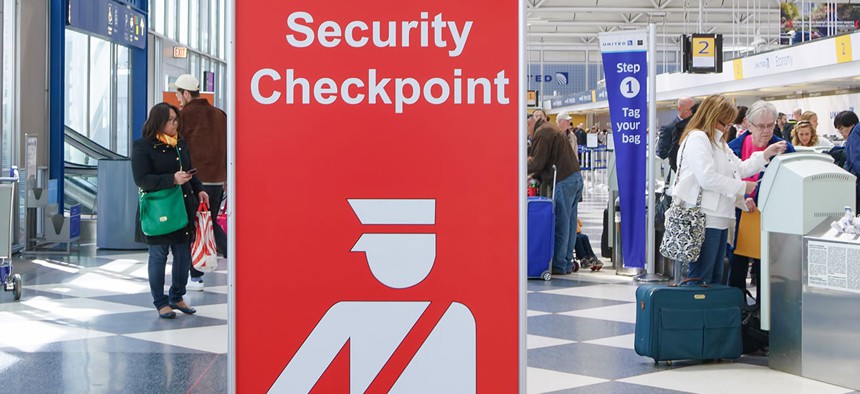
A sign directs travelers toward security checkpoints at O'Hare International Airport in Chicago in April. Sorbis / Shutterstock.com
What If the Terrorists Are Already Here?
How to talk about terrorism today—and how to stop talking about it
The statistics are as astounding as they are ignored: Americans are about as likely to be killed by their own furniture as by terrorists. Noncommunicable conditions like cardiovascular disease, cancer, and diabetes are responsible for vastly more American deaths than terrorism. Depending on how you count, gun violence in America kills hundreds or thousands of times more people than extremist attacks on U.S. soil.
“We spent over a trillion dollars and passed countless laws and devote entire agencies to preventing terrorist attacks on our soil,” President Obama observed after a mass shooting in 2015, in lamenting the lack of government action to address the far deadlier problem of gun violence.
It was a rare instance of a political leader seeking to place the terrorist threat in proper perspective. A very rare instance. When it comes to security issues, there are “a bunch of things that ought to be said that can’t be said in public,” notedForeign Policy’s David Rothkopf during a session on homeland security at the Aspen Ideas Festival, which is co-hosted by the Aspen Institute and The Atlantic. “If a politician were to stand up and say, “Terrorism’s a problem, but it’s not such a huge problem,’ they’d be done.”
“Every once in awhile, we ought to let facts guide what our fears are,” Rothkopf said. “When you look at polls of the top 10 fears of the American people, it tends to be things like public speaking, flying, things that will never kill anybody, when it really should be sugar.”
“Are we focused on the right bad guys? … Are we too guided by what dominates the headlines?” Rothkopf asked Jane Holl Lute, the former deputy secretary of the U.S. Department of Homeland Security.
“I think we’re way, way too dominated by a national-security mindset,” she responded. “And I think we need to understand the difference between looking at these issues with a national-security mindset as opposed to a homeland-security mindset. National security is strategic, it’s centralized, it’s top-driven. Homeland security is transactional, it’s decentralized, it’s bottom-driven—driven by the states and localities of this country.”
“What’s been our theory of the case for 12 or 15 years following 9/11?” Lute asked. “Our theory of the case is the bad guys are out there, trying to come here. … How are we going to deal with that? We’re going to find them and fix them, in a military sense, abroad. We have three tools: We have an intelligence tool, considerable. Our military, best in the world. And we have our security partnerships with NATO and with other countries bilaterally.”
“That’s great,” she continued. “What if [the bad guys are] here? What if they’re already here? What terrorist strike can succeed in this country unless there is already a basis of support [for the terrorist group in question]? How good is our intelligence capability going to serve us? Is the military deployed domestically? The Brits? NATO? Not really. So we need to think about the questions that you’re raising … from the perspective of homeland security.”
“We know, in Europe, that they’re there,” said Wolfgang Ischinger, a former German diplomat and the chairman of the Munich Security Conference. “It’s much easier for [terrorists] to come into our countries because it’s, for all practical purposes, not possible to completely control these many, many different borders. It’s a little easier for the United States with only two neighbors and the open sea on both sides.” Ischinger suggested creating an FBI-like organization for the European Union to help coordinate intelligence and homeland-security efforts—to “hunt a terrorist from Sicily to Norway and back.”
Such calls to reorient contemporary counterterrorism toward the homegrown terrorist threat—to, in Lute’s words, prioritize homeland security over national security—are a rejection of the logic that inspired Donald Trump’s proposed ban on Muslim immigration to the United States. They’re also more reflective of reality. Belgian and French citizens perpetrated the recent terrorist attacks in Paris and Brussels; American citizens were behind the carnage in San Bernardino and Orlando. U.S. citizens have been involved in 80 percent of the post-9/11 U.S. terrorism cases tracked by the New America Foundation.
Still, the question remains whether U.S. and European governments are excessively focused on the very real threat of terrorism, wherever it is originating from, and neglecting graver threats.
“Leadership, it seems to me, is sometimes about saying, ‘This is what we should be focused on. This is where the real risk lies,” Rothkopf said. “There are some countries where there have been multiple terrorist attacks, where they’re able to manage them and digest it and handle it a little bit better. And it causes less terror as a consequence.”
It was a last attempt to steer the security conversation away from the vortex of terrorism. But the vortex prevailed. During the nearly hour-long session, the panelists rarely strayed from the topic. Sugar wasn’t mentioned again.
NEXT STORY: The Navy Is Rigging Locusts to Sniff Out Bombs







